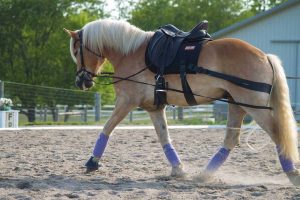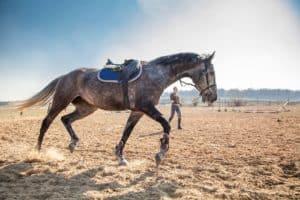
Proprioception and Strength Training Techniques for Horses
Helping your horse develop balance, core strength, and range of motion can be the key to injury prevention and better performance.

Helping your horse develop balance, core strength, and range of motion can be the key to injury prevention and better performance.

Leading researchers from around the world share their findings on this common joint disease of young horses.

Varying the surfaces on which you exercise your horse can help produce a strong, well-rounded equine athlete. Learn more in this article from the Summer 2023 issue of The Horse.

Learn how young horses’ bodies adapt to exercise and how to prepare them for successful careers.

Young horses in work have different nutritional needs than their adult counterparts.

Training horses in the spring and summer can present some challenges. Learn how your horse’s body adapts to exercise training, how he acclimates to spring and summer weather conditions, and what you can do to help him perform at his best.

Learn how young horses’ bodies adapt to exercise and how to prepare them for successful careers.

Do you have a young horse in your life? Learn about young horse growth, development, exercise, and nutrition during this Q&A.

Know how your horse’s body reacts to cold weather and train accordingly to make the most of the chilly months ahead.

Taking a horse from a sedentary state to active working fitness can be a form of rehabilitation. However, there’s no one-size-fits-all program. Learn how to safely transition your horse into an exercise program.

Recognizing and treating club feet in young horses can help them succeed in their intended discipline and, ultimately, prevent lifelong hoof complications.

The best age for horse to start training is highly debated. An equine surgeon offers advice.

This common exercise modality can be surprisingly risky; learn how to keep your horse—and yourself—safe.

If we use good sense in managing our youngsters, we can help protect their musculoskeletal systems over the long term with proper exercise. And that can help keep athletes healthier and prevent layups during their athletic careers.

Good footing, proper conditioning, balanced nutrition, and careful attention to joints and soft tissues are key to maintaining eventers, hunter/jumpers, and dressage horses.

Researchers said the data they collected will help them estimate how effective training and conditioning programs are in preparing three-day event horses for competition.
Stay on top of the most recent Horse Health news with
© 2022 Copyright Statement dolor sit amet, consetetur sadipscing User Terms, sed diam nonumy eirmod tempor invidunt ut labore et dolore magna aliquyam erat, sed diam voluptua. At vero eos et accusam et justo duo dolores et ea rebum. Stet clita kasd gubergren, no sea takimata sanctus est Lorem ipsum dolor sit amet.
"*" indicates required fields